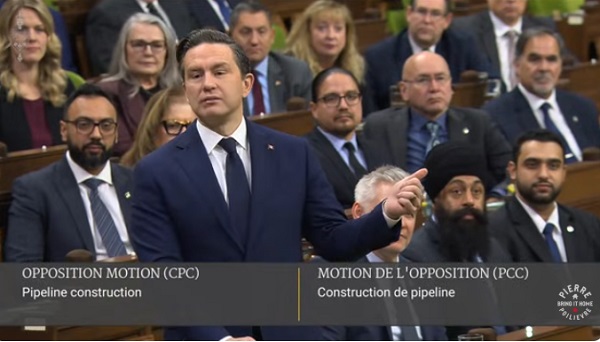Alberta
Canadian federal court overturns Trudeau gov’t ban on single-use plastics

From LifeSiteNews
The Federal Court ruled in favor of the provinces of Alberta and Saskatchewan, declaring that Prime Minister Justin Trudeau’s government overstepped its authority by classifying plastic as ‘toxic’ and banning all single-use plastic items, like straws
The Federal Court of Canada has overturned the Trudeau government’s ban on single-use plastic, calling it “unreasonable and unconstitutional.”
On November 16, the Federal Court ruled in favor of the provinces of Alberta and Saskatchewan, declaring that Prime Minister Justin Trudeau’s government overstepped its authority by classifying plastic as “toxic” and banning all single-use plastic items, like straws.
“There is no reasonable apprehension that all listed PMI [Plastic Manufactured Items] are harmful,” the decision read.
The decision came after a lawsuit filed a little over a year ago by Alberta and Saskatchewan. The ruling declared that listing all plastics on the List of Toxic Substances was too broad and “poses a threat to the balance of federalism as it does not restrict regulation to only those (plastics) that truly have the potential to cause harm to the environment.”
The court further reminded the Trudeau federal government of the autonomy of the provinces, saying, “Cooperative federalism recognizes that the provincial government and federal government are coordinate – the provinces are not subordinate to the federal government. A federal head of power cannot be given a scope that would eviscerate a provincial legislative competence.”
Essentially, the ruling overturned Trudeau’s 2022 law which outlawed manufacturing or importing plastic straws, cutlery, and checkout bags on the grounds of government claims that plastic was having a negative effect on the oceans. In reality, most plastic pollution in the oceans comes from a few countries, like India and China, which dump waste directly on beaches or rivers.
If not for the Federal Court’s ruling, the sale of these plastic products would have also been illegal by the end of this year.
RELATED: Trudeau gov’t-mandated paper straws may be worse for environment than plastic, study finds
The Government of Canada had estimated the average Canadian would pay at least $50 each in the higher costs for alternatives to traditional plastic products. Meanwhile, an August study revealed that paper straws may have a worse impact on humans and the environment than standard plastic straws as they contain “forever chemicals” which take thousands of years to break down.
Alberta Premier Danielle Smith celebrated the Court’s decision, saying, “Alberta wins again – Federal Court says Liberal plastic ban ‘both unreasonable and unconstitutional.’”
Smith compared the ruling to the Supreme Court’s recent announcement that Bill C-69, dubbed the “no-more pipelines” bill, is “mostly unconstitutional.” The decision returned jurisdiction over the pipelines to provincial governments.
“Like Bill C-69, the federal government’s decision to unilaterally label perfectly safe plastic consumer products as ‘toxic’ has had wide-ranging consequences for Alberta’s economic interests and has put thousands of jobs and billions of investments at risk,” Smith explained.
“It’s time for the federal government to listen to the courts and to Canadians,” she added. “We urge them to not appeal this decision, and to immediately delete ‘plastic manufactured items’ from Schedule 1 of the current Canadian Environmental Protection Act so as to avoid further need of legal action by Alberta and other provinces.”
Smith’s request comes as Environment Minister Steven Guilbeault announced Thursday that the federal government is “strongly considering an appeal” of the decision.
“Canadians have been loud and clear that they want action to keep plastic out of our environment,” he claimed. “We will have more to say on next steps soon.”
While Guilbeault attests that Canadians have been “loud and clear” in their desire to eliminate plastic, he is seemingly ignoring the growing number of Canadians calling for the Trudeau government to be replaced.
According to a November survey by Abacus Data, 84% of Canadians want a change in government, leaving only 16% of Canadians content with Trudeau and his Liberal government.
Alberta
Alberta introducing three “all-season resort areas” to provide more summer activities in Alberta’s mountain parks

Three iconic ski resorts to become summer hiking, mountain biking, zip-lining destinations.
Castle, Fortress and Nakiska have been designated as Alberta’s first all-season resort areas, making it easier for people to stay and play year-round.

For decades, red tape has restricted these resorts to winter operations and limited the ability to make facility upgrades or simply maintain existing facilities. These resorts are central to Alberta’s outdoor heritage, inspiring generations of athletes and outdoor enthusiasts. They have hosted world-class events such as the 1988 Olympics and served as the backdrop for cinematic blockbusters like The Revenant and Jumanji: The Next Level. All-season resort area designations support the revitalization of iconic resorts while maintaining strong environmental protections.
All-season resort areas will offer a wider variety of affordable and accessible recreation experiences for families, outdoor enthusiasts and visitors. These designations simplify regulatory processes while maintaining Alberta’s high environmental standards.
“Our government is proud to champion former Premier Peter Lougheed’s vision for Alberta’s Rockies, ensuring future generations can continue to access and enjoy these beautiful areas. By helping revitalize Alberta’s legendary ski resorts, we are striking the right balance of economic growth, environmental stewardship and Indigenous opportunity.”
Environmental excellence remains a core requirement. All projects must meet Alberta’s existing environmental standards, including the Public Lands Act, Water Act, and Environmental Protection and Enhancement Act, and will be subject to environmental assessment. Plans must address wildlife protection, water conservation, wildfire mitigation and sustainable visitor behaviour.
Since 2019, Alberta has expanded provincial parks and recreation areas by more than 300,000 hectares. As part of these designations, minor boundary adjustments ensure long-standing ski terrain is placed under the appropriate regulator, affecting less than 0.03 per cent of Alberta’s parks system.
“All-season destinations are all about serving community and building community. The new all-season policy will bring both social and economic opportunities to Alberta.”
Over the next decade, these three all-season resort areas have the potential to create 24,000 new jobs, $3.6 billion in GDP, and $4 billion in visitor spending. All-season resort developers and operators will be encouraged to partner with local businesses and use locally sourced materials, workforce talent, suppliers and service providers.
“Alberta’s outdoor recreation and resort potential was held back for decades by an unworkable land-use framework, even as our population grew. The new all-season resort regulations will now help catalyze responsible, year-round, nature-based development that draws new rural investment and strengthens Alberta’s culture of stewardship through lived connections with the land.”
All-season resorts present the opportunity to further support Indigenous economic participation, leadership and cultural inclusion in Alberta’s visitor economy. Alberta’s government is committed to continuing meaningful engagement with Indigenous communities, including ensuring that Treaty rights and traditional practices are respected.
To foster trust, transparency and collaboration in the development and management of all-season resorts, Indigenous groups were formally consulted by Alberta’s government as part of designation evaluations. Prospective project proponents must undertake consultations in accordance with Government of Alberta consultation policies and guidelines.
“Alberta’s first all-season resort areas mark an important step forward, and we are encouraged by the ongoing engagement between our Nations and proponents. When development respects our land and is built on true partnership with our communities, it creates meaningful opportunities for Indigenous Peoples, supporting economic growth, strengthening leadership and sharing our culture with visitors.”
“We look forward to working with the province to make sure that Treaty rights are upheld, protect the land and maintain open dialogue with our communities as these resorts move forward, ensuring Indigenous Peoples play a leading role in shaping Alberta’s visitor economy for generations to come.”
“The All-Seasons Resort Act presents a significant opportunity for meaningful Indigenous economic participation in the tourism sector. By capitalizing on this potential, Indigenous tourism can propel Alberta’s tourism sector to become a national leader and serve as a tangible tool for economic reconciliation, including job creation, language revitalization and cultural pride.”
Alberta’s government has created a clear regulatory pathway for all-season resorts. Designation is the first step in the regulatory process. Prospective project proponents can now begin Indigenous consultation, public engagement and proposal submissions to the regulator. Each proposal will be carefully reviewed by the regulator with input from subject matter experts and affected municipalities.
Revitalizing Alberta’s iconic ski resorts – STAKEHOLDER QUOTES
“Alberta’s outdoor recreation and resort potential was held back for decades by an unworkable land-use framework, even as our population grew. The new all-season resort regulations will now help catalyze responsible, year-round, nature-based development that draws new rural investment and strengthens Alberta’s culture of stewardship through lived connections with the land.”
“The All-Seasons Resort Act is exciting news for Alberta’s tourism sector. We welcome the clarity it gives to plan for the future of Kananaskis. We look forward to working with our partners and the province to support sustainable, year-round growth in a way that benefits our communities and protects what makes this place so special.”
“The All-Seasons Resort Act presents a significant opportunity for meaningful Indigenous economic participation in the tourism sector. By capitalizing on this potential, Indigenous tourism can propel Alberta’s tourism sector to become a national leader and serve as a tangible tool for economic reconciliation, including job creation, language revitalization and cultural pride.”
“All-season destinations are all about serving community and building community. The new all-season policy will bring both social and economic opportunities to Alberta.”
“Alberta’s first all-season resort areas mark an important step forward, and we are encouraged by the ongoing engagement between our Nations and proponents. When development respects our land and is built on true partnership with our communities, it creates meaningful opportunities for Indigenous Peoples, supporting economic growth, strengthening leadership and sharing our culture with visitors.”
“We look forward to working with the province to make sure that Treaty rights are upheld, protect the land and maintain open dialogue with our communities as these resorts move forward, ensuring Indigenous Peoples play a leading role in shaping Alberta’s visitor economy for generations to come.”
“Alberta Municipalities appreciates the provincial government’s commitment to municipal collaboration with the new All Season Resort Policy. Early consultation with municipalities results in stronger partnerships and better regional decisions that benefit Albertans.”
“AIOC welcomes the Government of Alberta’s leadership in ensuring Indigenous Nations and groups are engaged early in all-season tourism development. That approach supports reconciliation through responsible land stewardship, and long-term economic prosperity. With our expanded mandate, AIOC is ready to advance Indigenous-led tourism projects that drive investment and sustainable growth across the province.”
Alberta
They never wanted a pipeline! – Deputy Conservative Leader Melissa Lantsman

From Melissa Lantsman
Turns out the anti-development wing of the Liberal Party never stopped running the show.
Today, we’ll see if the Liberals vote for the pipeline they just finished bragging about.
Spoiler: they won’t. Because with the Liberals, the announcements are real, but the results never are.
-

 National1 day ago
National1 day agoLiberal bill “targets Christians” by removing religious exemption in hate-speech law
-

 Business2 days ago
Business2 days agoCanada invests $34 million in Chinese drones now considered to be ‘high security risks’
-

 Economy2 days ago
Economy2 days agoAffordable housing out of reach everywhere in Canada
-

 Business1 day ago
Business1 day agoLooks like the Liberals don’t support their own Pipeline MOU
-

 Business2 days ago
Business2 days agoThe Climate-Risk Industrial Complex and the Manufactured Insurance Crisis
-

 Crime1 day ago
Crime1 day agoInside the Fortified Sinaloa-Linked Compound Canada Still Can’t Seize After 12 Years of Legal War
-

 Health2 days ago
Health2 days agoThe Data That Doesn’t Exist
-

 Business1 day ago
Business1 day agoCanada Can Finally Profit From LNG If Ottawa Stops Dragging Its Feet



